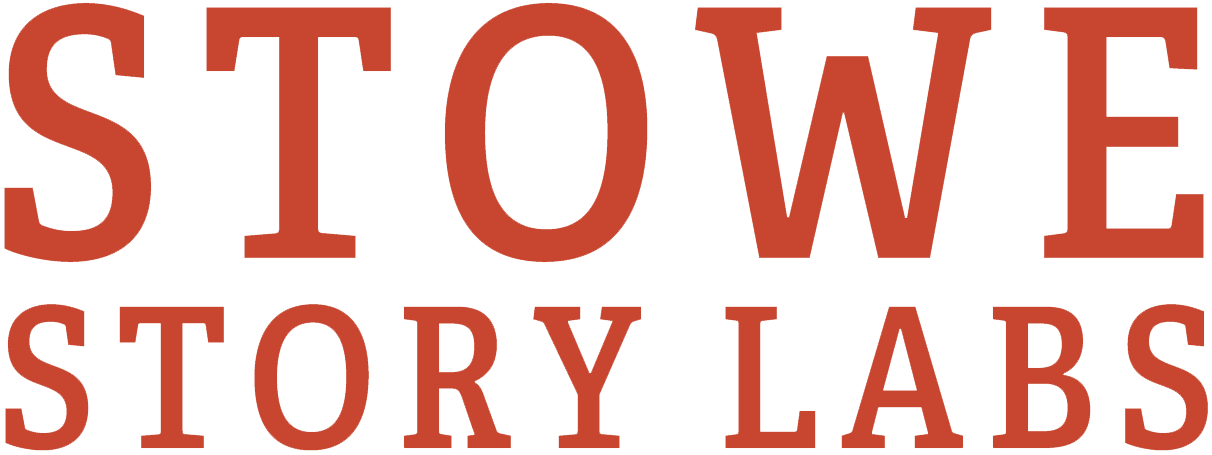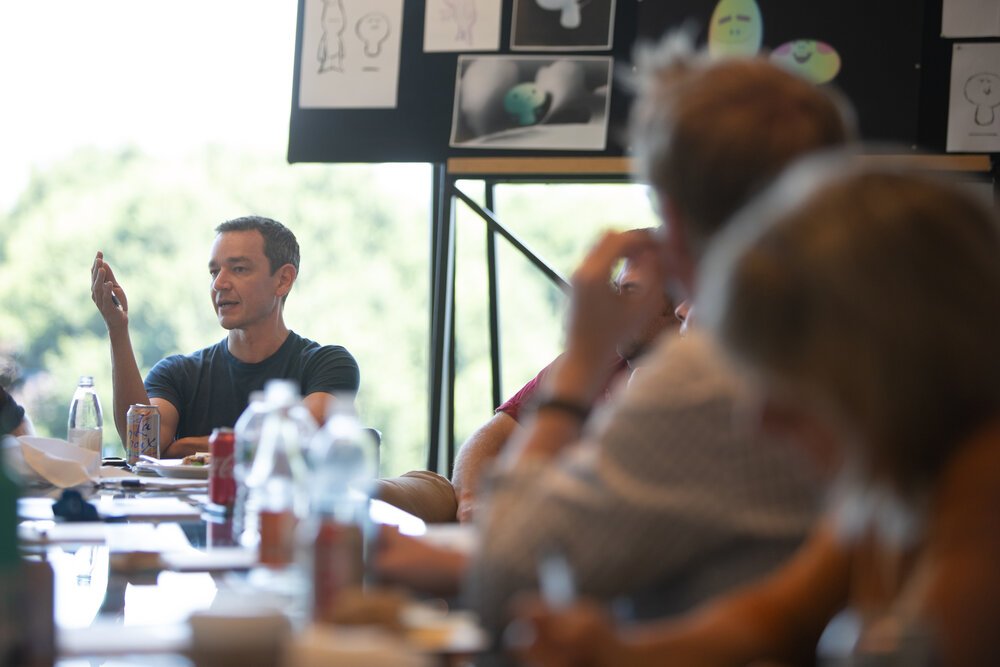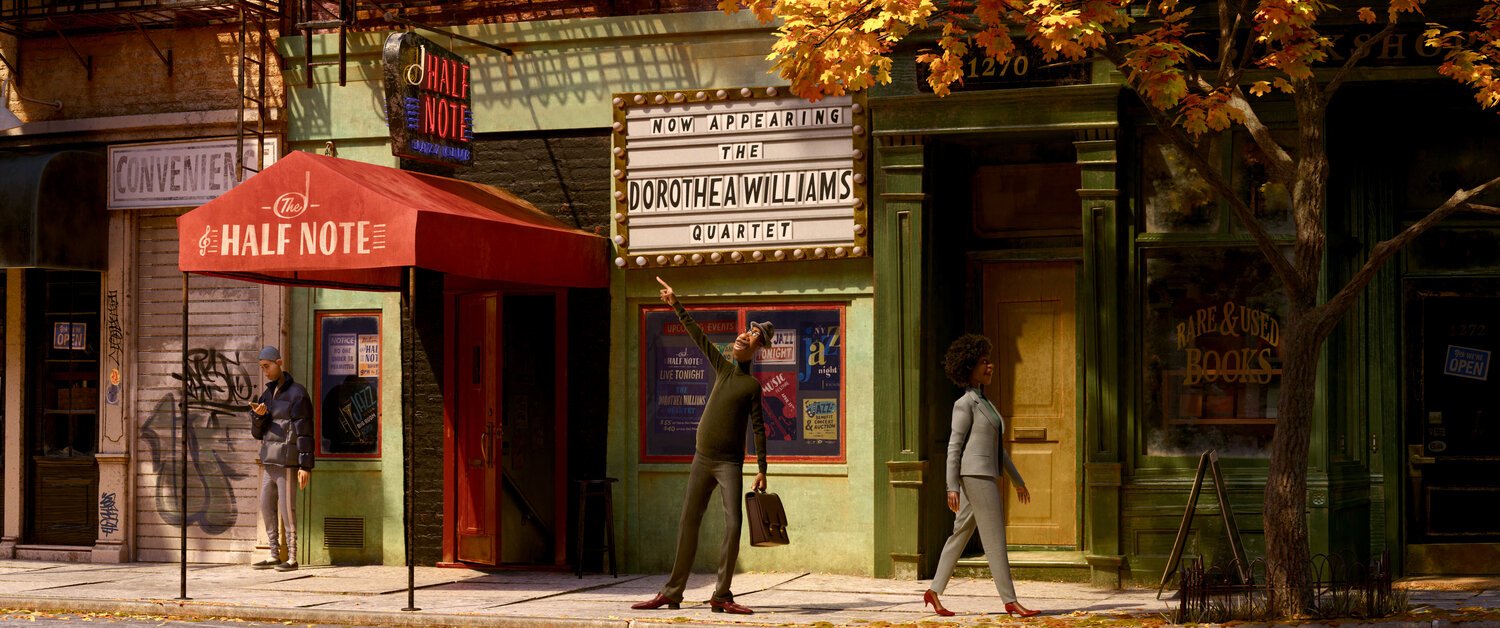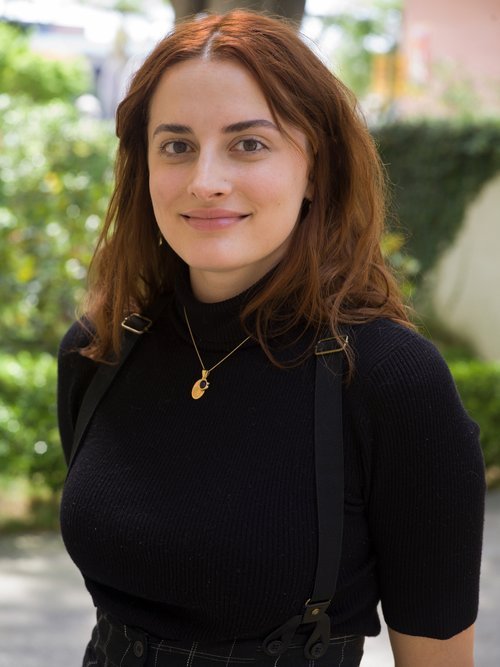Mentor Profile: Mike Jones
SCREENWRITER AND STOWE STORY LABS MENTOR MIKE JONES TALKS SOUL
By Marian Cook
Stowe Story Labs Mentor Mike Jones speaks at a braintrust meeting for SOUL
The year 2020 hasn’t been easy for anyone. But after a storm, there’s always a rainbow, and that’s what Pixar’s SOUL (co-written by Stowe Story Labs Mentor Mike Jones) was for many this holiday season.
Released on Christmas Day via Disney+, “SOUL is about what it means to live a fulfilled life. It’s not about the meaning of life, it’s about what gives your life meaning,” Mike stated.
It’s a dazzling film, and equally mesmerizing is Mike’s story. I sat down with him to discuss his career journey, how he came to understand that grand question, and how the answer fits in with what he’s doing today.
Currently, Mike is the Senior Story and Creative Artist at Pixar Animation Studios, meaning he works with the studio’s directors, artists, editors, and other writers on every aspect of the story. For SOUL, the process was the same, and as always, it was slow and steady. Four years, in fact. The work is “incredibly collaborative – you can’t really silo yourself off at Pixar,” Mike explained.
For instance, Mike wrote the screenplay along with Kemp Powers and Pete Doctor. They had constant conversations with animators to see where they could externalize the internal, meaning show emotion or thoughts through action rather than dialogue. They consulted an eclectic array of experts, from musicians like Jon Batiste to cultural educators like Johnnetta B. Cole.
And that collaborative nature served well as today SOUL is getting rave reviews and is 95% fresh on Rotten Tomatoes. Mike’s next Pixar movie is slated to be released this summer, a coming-of-age story set in Italy and titled LUCA.
But how did an English teacher from San Antonio, Texas, get to be working at Pixar? It started with writing a script and submitting it to NYU in the pursuit of studying cinematography. It wasn’t until a teacher pulled him aside and told him that he was a good writer that he gave his complete attention to screenwriting. And then it was a long journey.
He worked for a stretch as an entertainment journalist for publications such as Filmmaker Magazine, IndieWire, and eventually Variety. At the same time, he was writing scripts at home, honing his craft by watching dozens of films, sending his scripts to competitions, and sending query letters to agents. Eventually, something bit. His script “Miller” got the attention of two Oscar winners. Although it never got made, it landed him representation and opened doors.
(L-R) Marcus McLaurine, music consultant for SOUL, speaks with Stowe Story Labs Mentor Mike Jones.
“I think it was because I just decided to try to do it myself. When it looks like a film is going to happen, people start to take notice,” Mike explained.
With an agent and manager in tow, Mike’s spec scripts were getting more attention, specifically from a beloved and highly decorated animation studio: Pixar.
Today, Mike is doing what he loves. He never imagined himself to be working at Pixar, but he regards animation in the same light as live action. Mike said, “The funny thing is that Pixar doesn’t really look for animation writers, they’re looking for dramatic writers. Animation is just life in motion.”
So when it came time to write SOUL, he dug deep, examining his notions, relationships, and experiences. He was especially drawn to thoughts about his father. Mike lost his father during the production of SOUL, and it was in those last moments with his dad that Mike began to wonder, “What is going through his head as he looks at his life, if he is, in the rearview mirror? Is it the success that he had? The lack of success? Does he regret something?”
He continued, “Or perhaps he’s just enjoying the moment of being with his son, as his son holds his hand as he passes away. And I thought, well this is certainly the most important moment in my life, more important than my career.”
And from that devastating loss, (spoiler alert!) came one of the most powerful moments in the film: the piano sequence as Joe lays bare all the trinkets 22 collected throughout the day. Joe realizes that a “spark isn’t a soul’s purpose,” rather it’s just being ready to live. That there’s more to life than dreams and success, sometimes it’s just about enjoying every minute, even the most mundane or painful ones.
Feelings of inadequacy haunt people across all fields, but it could be said especially for those in the arts. In film, it’s harder even, because it’s also a business and can be cutthroat and exclusionary. It’s easy to be hard on yourself when you don’t accomplish what you want, whether it be a pass on a script, a position, a movie deal, or a film school acceptance.
Joe Gardner, SOUL’s protagonist voiced by Jamie Foxx, celebrates landing the gig of a lifetime.
Mike advises to “be patient with [yourself]. Give it time.” He continued, “There’s this drive to be successful fast as a screenwriter, but there’s a lot of screenwriters out there and there’s a lot of people trying to be screenwriters. Make your work as unique and as standout as you possibly can.”
Mike added, “It’s about creating a team of people around you to help you build confidence about your work. That will be honest with you, but also like to read it and want to read it...That kept me going.”
At Stowe, you can find that community, not only to provide feedback, but to be in your corner as you work to break down industry barriers, to help you make the most of what you want to do. To support you not as you search for the meaning of life, but search for meaning in your life.
Marian Cook is a former journalist, Stowe Story Labs staff member, and current USC student pursuing an MFA in directing. She’s been published over a dozen times, covering topics from local news to federal healthcare legislation. Although she loves the world of journalism, having done documentaries on a range of topics from plastic surgery to segregation in the church, her real passion lies in narrative film. She one day hopes to be a writer-director and tell strong, female-led stories, especially that of Latinas. When she’s not filming, she likes to explore, listen to blues and jazz, brush up on her French, and absorb everything science fiction related. Learn more at http://mariandcook.weebly.com/. At Stowe Story Labs, Marian assists with all aspects of operations, writes for the newsletter, and assists with research and writing to support fundraising and communications about programs.




